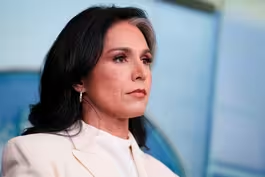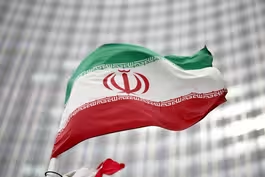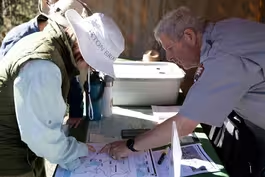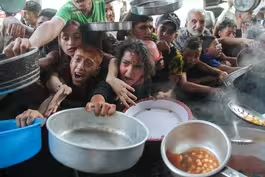
Loretta Ross explores a new way to face disagreements
Clip: 7/23/2025 | 8m 8sVideo has Closed Captions
'Tell me more': Activist Loretta Ross explores a new way to face disagreements
Loretta Ross was once known for her fiery temper, shaped by more than 50 years on the front lines battling racism, sexism and sexual violence. At 71, she says she has come to understand there’s a more effective way to face disagreements. Judy Woodruff spoke with Ross about her method of turning tough conversations into productive ones. It’s part of her series, America at a Crossroads.
Problems playing video? | Closed Captioning Feedback
Problems playing video? | Closed Captioning Feedback
Major corporate funding for the PBS News Hour is provided by BDO, BNSF, Consumer Cellular, American Cruise Lines, and Raymond James. Funding for the PBS NewsHour Weekend is provided by...

Loretta Ross explores a new way to face disagreements
Clip: 7/23/2025 | 8m 8sVideo has Closed Captions
Loretta Ross was once known for her fiery temper, shaped by more than 50 years on the front lines battling racism, sexism and sexual violence. At 71, she says she has come to understand there’s a more effective way to face disagreements. Judy Woodruff spoke with Ross about her method of turning tough conversations into productive ones. It’s part of her series, America at a Crossroads.
Problems playing video? | Closed Captioning Feedback
How to Watch PBS News Hour
PBS News Hour is available to stream on pbs.org and the free PBS App, available on iPhone, Apple TV, Android TV, Android smartphones, Amazon Fire TV, Amazon Fire Tablet, Roku, Samsung Smart TV, and Vizio.
Providing Support for PBS.org
Learn Moreabout PBS online sponsorshipGEOFF BENNETT: As our national politics grow increasingly polarized, Judy Woodruff explores one approach to transforming divisive conversations into meaningful dialogue.
It's part of her series America at a Crossroads.
LORETTA ROSS, Author, "Calling In: How to Start Making Change with Those You'd Rather Cancel": I have been an activist since I was 16 years old.
JUDY WOODRUFF: Loretta Ross was once known for her fiery temper, shaped by more than 50 years on the front lines battling racism, sexism and sexual violence.
LORETTA ROSS: But by the time I got to my 60s, I began to feel that how we did the work was more important than the issues that we worked on.
JUDY WOODRUFF: Ross, now 71, says she came to understand there's a more effective way to engage people she disagrees with.
That realization is at the heart of her new book, "Calling In: How to Start Making Change with Those You'd Rather Cancel."
LORETTA ROSS: When you're calling people out, that means you're intentionally publicly blaming and shaming them for something you think they have done wrong and you want to hold them accountable.
But the problem with the callout is that, instead of inviting them into a conversation, you have invited them into a fight.
When I started thinking about calling in, I said, we can achieve accountability, but we don't have to be angry to do it.
Because I think I have had as many blessings as I have had obstacles in life.
JUDY WOODRUFF: A survivor of childhood rape, Ross managed to channel her trauma into a driving force for her advocacy.
LORETTA ROSS: Because I'd been through so much as a child, I had to make the decision that what I'd been through wouldn't determine what I would become.
I mean, I couldn't let the man who committed incest against me just make me a teenage statistic, pregnant with no options.
I mean, I just couldn't let these other people's dirty fingerprints determine who Loretta Ross has become.
And do not ask me where it comes from.
When somebody told me I couldn't, that fueled my passion for I could.
JUDY WOODRUFF: In 1979, at just 25 years old, Ross became the executive director of Washington's D.C. Rape Crisis Center, where she worked to support victims.
It was also there that she experienced a pivotal moment after receiving a letter from a man in prison in Lorton, Virginia, just south of Washington.
LORETTA ROSS: I got this letter from a man called William Fuller.
and his letter basically said, outside, I raped women.
Inside, I rape men.
I'd like not to be a rapist anymore.
And I swear, when I got that letter, all I wanted to do was call him out, because we didn't have enough resources to help victims, and here's a perpetrator calling for help?
I mean, how dare you?
So my motives weren't clean when I went to Lorton.
I actually went there to curse him out and to say I told you so.
Everything that's happened to you, you deserved.
And I reprocessed what I went through then and realized that this rapist called me in, because he could see how afraid I was.
JUDY WOODRUFF: She says that day would be a turning point.
LORETTA ROSS: Because I was only expecting one, and there were six of them, with them telling the stories about what they'd been through.
And once I started hearing what they'd been through, how they had entered Lorton as teenagers, become victims before they became violators, and that just changed everything I thought I knew about rapists.
Now, I'm not trying to excuse the fact that they raped and murdered women, but I began to understand the patterns that they had been caught up in, as well as the patterns I had been caught up in.
JUDY WOODRUFF: This led Ross to reflect on what drives people to call out others, a practice she says often entrenched existing beliefs and deepens divisions.
Now a professor at Smith College in Massachusetts, she teaches courses on the subject here and online.
LORETTA ROSS: And I find that a lot of the callout culture is not driven by malice, but unhealed trauma.
And we feel we have to hurt people to prove we have been hurt, which is not a good way to walk through life, but that's the autopilot that a lot of us are on.
And so I'm hoping that we can deal with our trauma, deal with what we have been through in more productive ways, because it's not doing us any good and it certainly isn't doing any good for the people that we need to be in relationship with.
JUDY WOODRUFF: She's particularly concerned about how national divisions have strained relationships within families.
LORETTA ROSS: I'm trying to teach people, don't go home and turn over the Thanksgiving dinner table just because they don't realize the role of Pilgrims and stuff like that.
This just is not how you do that.
And so the phrase I use is learning.
Learn how to handle your passion with compassion.
But I believe you can say what you mean and you can mean what you say.
You just don't have to say it mean.
JUDY WOODRUFF: How would a conversation go?
If you're talking to somebody and you know they have been speaking in a way that you think is hurtful, harmful, what would that sound like?
LORETTA ROSS: The most important three words you can use in a conversation is, tell me more.
If you bring your honest sense of inquiry, you can have a conversation with anybody.
I swear, people love telling you about themselves if you give them an invitation.
And you're having a conversation, instead of a fight.
It's just that easy really.
JUDY WOODRUFF: And while it's sometimes easier to practice this with family, Ross says she came to see it as a tool that could be used more broadly to help people discover common ground.
So, before you wrote this book, the books you wrote were -- have been about politics and about issues and policy.
This is a different book.
What made you think that this was something that you wanted to get out there?
LORETTA ROSS: What's really bad about this time is that our opinions have become our identities.
Now we make enemies of people who don't perfectly align with us.
And that's why the callout culture so dangerous, because we take people who we largely agree with and unnecessarily make enemies out of them because there's not that perfect alignment.
And heaven help us if they're really on the other side of the political divide.
Then we demonize them.
JUDY WOODRUFF: As you think about what's going on today, is one side or another, is it the right or the left that's more guilty of this too much calling out?
LORETTA ROSS: Well, the difference I think between the right and the left is who has the levers of power to impose their prejudices on others.
And what I have seen is that the left can be mighty intolerant, but we have a tendency not to weaponize the law and the police against everybody we don't tolerate.
We don't have a tendency as much to ban books or to say that human beings are basically illegal.
I mean, we just don't take it that far.
JUDY WOODRUFF: Given how deeply polarized we are right now in this country, is this the kind of thing that can make a difference, do you think?
LORETTA ROSS: I work on the assumption that most people are capable of compassion and being good.
It just may be they have a very narrow circle to which they extend that compassion and kindness.
But I also believe that most people can be encouraged to widen that same circle, because we do it for strangers in an earthquake.
Can we do it with the neighbor who has the rainbow flag?
We can actually have a sense of shared need and shared values, even though we have different solutions to the problem sometimes.
JUDY WOODRUFF: For the "PBS News Hour," I'm Judy Woodruff in Northampton, Massachusetts.
Gabbard sows doubt on Russia probe as Trump faces pressure
Video has Closed Captions
Clip: 7/23/2025 | 5m 36s | Gabbard pushes report on Obama and Russia probe as Trump faces pressure over Epstein (5m 36s)
GOP and Democratic strategists on Trump's Epstein connection
Video has Closed Captions
Clip: 7/23/2025 | 7m 55s | GOP and Democratic strategists analyze renewed focus on Trump's connection with Epstein (7m 55s)
Iran will continue uranium enrichment despite U.S. strikes
Video has Closed Captions
Clip: 7/23/2025 | 1m 30s | Iran says it will continue uranium enrichment despite U.S. strikes on nuclear facilities (1m 30s)
National parks struggle with funding and staffing cuts
Video has Closed Captions
Clip: 7/23/2025 | 8m 51s | How the National Parks Service is struggling with drastic funding and staffing cuts (8m 51s)
News Wrap: Aid groups warn of starvation and death in Gaza
Video has Closed Captions
Clip: 7/23/2025 | 7m 38s | News Wrap: Aid groups warn of 'chaos, starvation and death' in Gaza (7m 38s)
What's in Trump's new AI policy and why it matters
Video has Closed Captions
Clip: 7/23/2025 | 6m 37s | What's in Trump's new AI policy and why it matters (6m 37s)
What the new trade deal with Japan means for the U.S.
Video has Closed Captions
Clip: 7/23/2025 | 6m 30s | What the new trade deal with Japan means for U.S. businesses and consumers (6m 30s)
Providing Support for PBS.org
Learn Moreabout PBS online sponsorshipSupport for PBS provided by:
Major corporate funding for the PBS News Hour is provided by BDO, BNSF, Consumer Cellular, American Cruise Lines, and Raymond James. Funding for the PBS NewsHour Weekend is provided by...


















